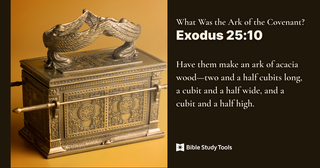
- Recent Translations
- All Translations
Chūāijíjì 25
Share
Settings
Images for Chūāijíjì 25

Chūāijíjì 25 Commentary
Chapter 25
What the Israelites were to offer for making the tabernacle. (1-9) The ark. (10-22) The table, with its furniture. (23-30) The candlestick. (31-40)
Verses 1-9 God chose the people of Israel to be a peculiar people to himself, above all people, and he himself would be their King. He ordered a royal palace to be set up among them for himself, called a sanctuary, or holy place, or habitation. There he showed his presence among them. And because in the wilderness they dwelt in tents, this royal palace was ordered to be a tabernacle, that it might move with them. The people were to furnish Moses with the materials, by their own free will. The best use we can make of our worldly wealth, is to honour God with it in works of piety and charity. We should ask, not only, What must we do? but, What may we do for God? Whatever they gave, they must give it cheerfully, not grudgingly, for God ( 2 Corinthians. 9:7 ) service of God, we must reckon well bestowed; and whatsoever is done in God's service, must be done by his direction.
Verses 10-22 The ark was a chest, overlaid with gold, in which the two tables of the law were to be kept. These tables are called the testimony; God in them testified his will. This law was a testimony to the Israelites, to direct them in their duty, and would be a testimony against them, if they transgressed. This ark was placed in the holy of holies; the blood of the sacrifices was sprinkled, and the incense burned, before it, by the high priest; and above it appeared the visible glory, which was the symbol of the Divine presence. This was a type of Christ in his sinless nature, which saw no corruption, in personal union with his Divine nature, atoning for our sins against it, by his death. The cherubim of gold looked one towards another, and both looked downward toward the ark. It denotes the angels' attendance on the Redeemer, their readiness to do his will, their presence in the assemblies of saints, and their desire to look into the mysteries of the gospel. It was covered with a covering of gold, called the mercy-seat. God is said to dwell, or sit between the cherubim, on the mercy-seat. There he would give his law, and hear supplicants, as a prince on his throne.
Verses 23-30 A table was to be made of wood, overlaid with gold, to stand in the outer tabernacle, to be always furnished with the shew-bread. This table, with the articles on it, and its use, seems to typify the communion which the Lord holds with his redeemed people in his ordinances, the provisions of his house, the feasts they are favoured with. Also the food for their souls, which they always find when they hunger after it; and the delight he takes in their persons and services, as presented before him in Christ.
Verses 31-40 The candlestick represents the light of God's word and Spirit, in and through Christ Jesus, afforded in this dark world to his believing people, to direct their worship and obedience, and to afford them consolations. The church is still dark, as the tabernacle was, in comparison with what it will be in heaven; but the word of God is a light shining in a dark place, ( 2 Peter. 1:19 ) it. In ver. ( 40 ) is an express caution to Moses. Nothing was left to his own fancy, or to that of the workmen, or the people; but the will of God must be observed in every particular. Christ's instruction to his disciples, ( Matthew 28:20 ) , is like this, Observe all things whatsoever I have commanded you. Let us remember that we are the temples of the Holy Ghost, that we have the law of God in our hearts, that we are to live a life of communion with God, feast on his ordinances, and are the light of the world, if indeed we are followers of Christ. May the Lord help us to try ourselves by this view of religion, and to walk according thereto.
Chūāijíjì 25 Commentaries
Chapter Summary
INTRODUCTION TO EXODUS 25
In this chapter an order is given for a freewill offering towards various things for the worship and service of God, and the materials to be offered, which would be useful and acceptable, are mentioned particularly, Ex 25:1-7, as also another order to build a sanctuary for God, after a model that he would give, Ex 25:8,9, and, an ark to put in the law on tables of stone, the fashion of which, and the various things belonging to it, are described, Ex 25:10-16, and a mercy seat with cherubim on it to be set over the ark, where the Lord promises to meet Moses and commune with him, Ex 25:17-22 and a table with various appurtenances to it to place the shewbread on, Ex 25:23-30 and a candlestick of gold, whose parts are described, and all the instruments relative to it, Ex 25:31-40.